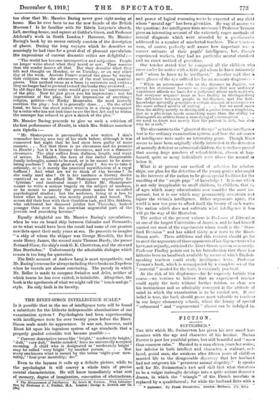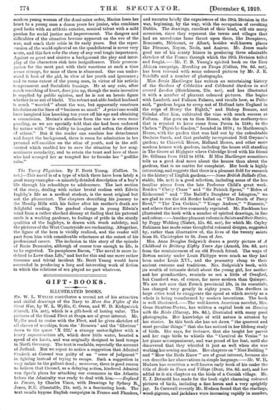FICTION.
SEPTEMBER. 4`
TIIE title which Mr. Swinnerton has given his new novel har- monizes with the age and character of his heroine. Marian Forster is past her youthful prime, but still beautiful and " more than common calm." Married to a man eleven years her senior, her inferior in both intellect and character, a stalwart, red- faced, genial man, she awakens after fifteen years of ehildleat married life to the disagreeable discovery that her husband had not outgrown his " persistent animal stupidity." It speaks well for Mr. Swinnerton's tact and skill that what threatens to be a vulgar imbroglio develops into a quite serious domest'a drama, in which the " triangle " of the French novelists is replaced by a quadrilateral ; for while the husband flirts with a
September. By Frank Swinnerton. London : Methuen. (7s. net.] modern young woman of the demi-minx order, Marian loses her heart to a young man a dozen years her junior, who combines good looks with an athletic exterior, musical talent with a mild passion for social justice and improvement. The dangers and difficulties of the situation become apparent on the eve of the war, and reach their crisis in its early years. But the reper- cussion of the world-upheaval on the quadrilateral is never very acute, and this fact robs the story of any real tragic importance. Against so great and sinister a background the play and inter- play of the characters sink into insignificance. Their preoccu- pation for the most part with their emotions at such a time seems strange, for none of them is abnormal. One can under- stand it best of the girl, in view of her youth and ignorance ; and to some extent of the young man, in virtue of his artistic temperament and Socialistic leanings. He at any rate, after much searching of heart, does join up, though the main incentive is supplied by public opinion, and he is not an heroic figure whether in or out of khaki. The robust and able-bodied husband is much " worried " about the war, but apparently construes his duties on the lines of " business as usual." A priori one would have imagined him knocking ten years off his age and obtaining a commission. Marian's aloofness from the war is even more puzzling, as we are specially told that she had been endowed by nature with " the ability to imagine and soften the distress of others." But if the reader can emulate her detachment and forget the background, there is room for admiration in her personal self-sacrifice on the altar of youth, and in the self- control which enabled her to save the situation by her mag- nanimous mendacity, and to retain the trust and love of those who had wronged her or tempted her to forsake her " godlike calm."















































 Previous page
Previous page